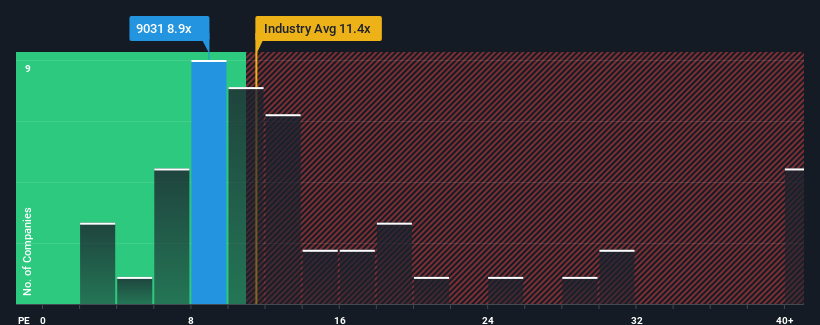- Japan
- /
- Transportation
- /
- TSE:9031
Benign Growth For Nishi-Nippon Railroad Co., Ltd. (TSE:9031) Underpins Its Share Price
When close to half the companies in Japan have price-to-earnings ratios (or "P/E's") above 14x, you may consider Nishi-Nippon Railroad Co., Ltd. (TSE:9031) as an attractive investment with its 8.9x P/E ratio. Although, it's not wise to just take the P/E at face value as there may be an explanation why it's limited.
Nishi-Nippon Railroad hasn't been tracking well recently as its declining earnings compare poorly to other companies, which have seen some growth on average. The P/E is probably low because investors think this poor earnings performance isn't going to get any better. If you still like the company, you'd be hoping this isn't the case so that you could potentially pick up some stock while it's out of favour.
View our latest analysis for Nishi-Nippon Railroad

How Is Nishi-Nippon Railroad's Growth Trending?
The only time you'd be truly comfortable seeing a P/E as low as Nishi-Nippon Railroad's is when the company's growth is on track to lag the market.
If we review the last year of earnings, dishearteningly the company's profits fell to the tune of 20%. At least EPS has managed not to go completely backwards from three years ago in aggregate, thanks to the earlier period of growth. Accordingly, shareholders probably wouldn't have been overly satisfied with the unstable medium-term growth rates.
Shifting to the future, estimates from the two analysts covering the company suggest earnings growth is heading into negative territory, declining 3.8% each year over the next three years. Meanwhile, the broader market is forecast to expand by 9.7% per year, which paints a poor picture.
In light of this, it's understandable that Nishi-Nippon Railroad's P/E would sit below the majority of other companies. Nonetheless, there's no guarantee the P/E has reached a floor yet with earnings going in reverse. Even just maintaining these prices could be difficult to achieve as the weak outlook is weighing down the shares.
The Final Word
Generally, our preference is to limit the use of the price-to-earnings ratio to establishing what the market thinks about the overall health of a company.
We've established that Nishi-Nippon Railroad maintains its low P/E on the weakness of its forecast for sliding earnings, as expected. At this stage investors feel the potential for an improvement in earnings isn't great enough to justify a higher P/E ratio. It's hard to see the share price rising strongly in the near future under these circumstances.
Plus, you should also learn about these 3 warning signs we've spotted with Nishi-Nippon Railroad (including 2 which shouldn't be ignored).
If P/E ratios interest you, you may wish to see this free collection of other companies with strong earnings growth and low P/E ratios.
Valuation is complex, but we're here to simplify it.
Discover if Nishi-Nippon Railroad might be undervalued or overvalued with our detailed analysis, featuring fair value estimates, potential risks, dividends, insider trades, and its financial condition.
Access Free AnalysisHave feedback on this article? Concerned about the content? Get in touch with us directly. Alternatively, email editorial-team (at) simplywallst.com.
This article by Simply Wall St is general in nature. We provide commentary based on historical data and analyst forecasts only using an unbiased methodology and our articles are not intended to be financial advice. It does not constitute a recommendation to buy or sell any stock, and does not take account of your objectives, or your financial situation. We aim to bring you long-term focused analysis driven by fundamental data. Note that our analysis may not factor in the latest price-sensitive company announcements or qualitative material. Simply Wall St has no position in any stocks mentioned.
About TSE:9031
Nishi-Nippon Railroad
Engages in the transportation business in Japan and internationally.
Fair value with acceptable track record.
Market Insights
Community Narratives



